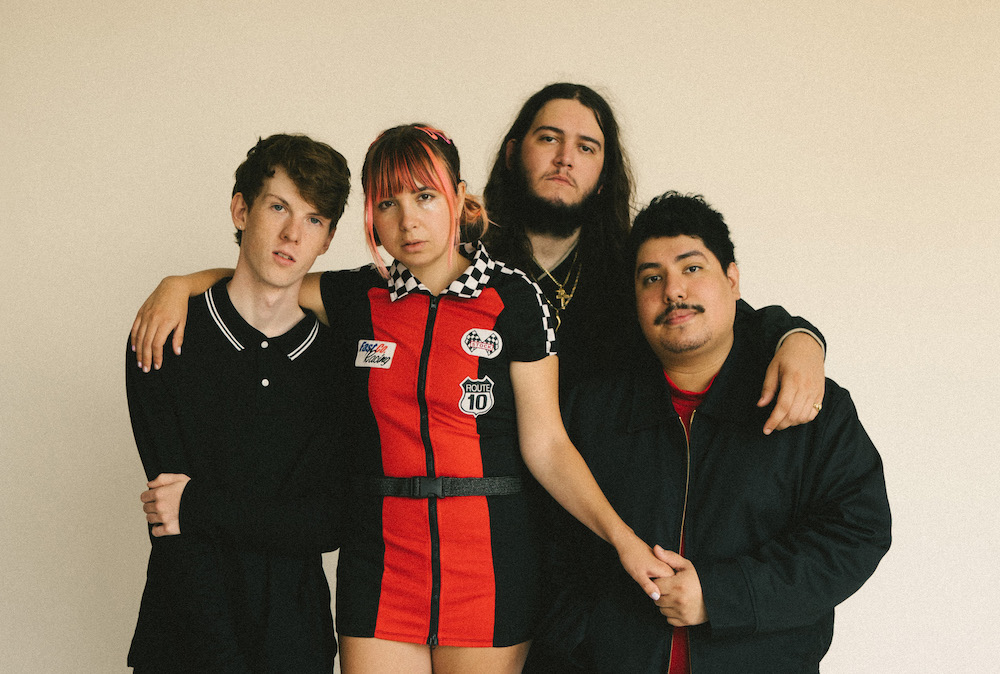Beach Bunny’s Lili Trifilio is like everyone’s big sister. She is undeniably cool—a well-balanced, frequently pink-haired Libra, succeeding in making her artistic dreams come true while failing in romantic relationships.
“The stars aligned,” Trifilio tells SPIN over the phone, speaking about her 2019 graduation from DePaul University with a journalism degree. “I could not find a job for the life of me for three months, and then at the end of those three months, we got this amazing label deal. It really did work out. It felt like I manifested it, as crazy as that sounds.”
The 23-year-old does not need to juggle music with anything else. The success of “Prom Queen,” the title track from Beach Bunny’s 2018 EP, catapulted them into an ideal position for an indie band—especially prior to a debut album. When the LP arrived, 2020’s Honeymoon, it was clear that Beach Bunny could not only capture fans’ attention but hold it and excite them further. That success was not mere luck; making music plays a major role in Trifilio’s life, so much so that she once recorded a voice memo of her singing a melody in an Olive Garden bathroom.
“I was like, I need to get this down somewhere or I’ll forget it,” she says, laughing. “It was really embarrassing, because I was trying to be super quiet but I just needed to bite the bullet.”
Blame Game, out Jan. 15 on Mom + Pop Records, is an immersive four-song EP that watches our big sister decide to be a good role model — for fans, but also for herself. Trifilio is on vocals and guitar, with Matt Henkels also on guitar, Anthony Vaccaro on bass and Jon Alvarado on drums.
The first track, “Good Girls (Don’t Get Used),” is an anthem that Trifilio wrote in five minutes while “angry crying” about not taking shit. Its lyrics are unsparing: “Stop saying, ‘It’s my bad’ / You’re acting like your deadbeat dad.” She is confident, breaking the power dynamic, refusing to be a submissive victim.
“I just felt like a lot of songs on Honeymoon tolerated toxic behaviors because that’s what I was doing at the time,” she says. “On the newer songs, I’m trying to write from the outside perspective and being like, ‘you should walk away from painful situations at a certain point.’”
It’s hard not to root for Trifilio, to not step into her shoes and think of someone in our own lives when she sings, “If you adore me / Why do you ignore me?” on “Good Girls (Don’t Get Used).” Her frustrations with love are on the nose and ridiculously poetic. It’s the reason young women—especially ones on TikTok—are digging Beach Bunny; Trifilio, in her reckonings, is relatable and presents universal struggles in a refreshing, visceral way.
On “Promises,” the alluring first track of Honeymoon, she yells in the chorus: “A part of me still wants you, a part of me wants to fall asleep / When we’re all alone in your bedroom, you came like a reoccurring dream / Part of me still hates you, how could you love someone and leave? / When you’re all alone in your bedroom, do you ever think of me?” It’s funny, beautiful, dark and complicated, set against an invigorating power pop bombast. It sounds simple, but it’s not.
Even though Blame Game wallows less and gets riled up more, the vulnerability and honesty are retained. The EP leans into their punk edge, which they’ve always had, but was mostly evident at live performances where crowds start mosh pits and sometimes break into sides to form a “wall of death.”
“Originally it was just me and an acoustic guitar—very soft,” Trifilio recalls with a giggle. “In the music scene in Chicago, there’s a lot of emo bands and punk bands—honestly, all guy bands. Despite that, they’ve kind of accepted me into their circle even though I’m this… soft child! I think from that [I was inspired], and just from seeing how crazy their shows ended up being.”
The title track closes the EP out on a bleak note. “I’m tired of the world perceiving me,” Trifilio drawls against repetitive melodies, listing ways in which being a woman means facing danger, being degraded, being judged.
“As I started writing it, I did get angry and pissed off,” she says. “It was one of those songs that wrote itself.” Her anger is clear, especially when the song picks up 80 seconds in, becoming more of a chant at a protest. “Yeah, it’s my problem, I’m asking for it / Guess you’re the victim and I’m the suspect,” she quips in a defeated tone.
Still, the track itself is a victory—one that girls and young women will blast through their earphones, dance around their room to, yell along and fistpump to, mosh and crowdsurf to. Life sucks, but at least our big sister from Beach Bunny encourages us to fight back, to have power, to persist and resist in any way possible.





